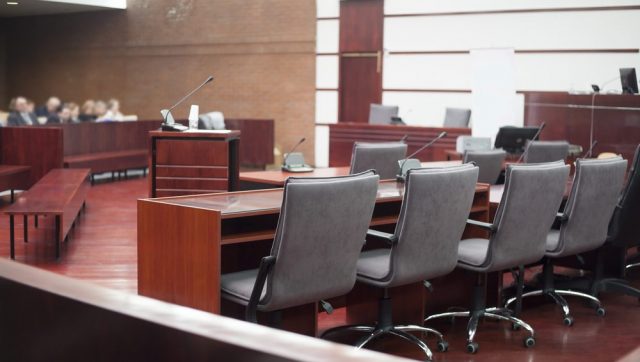LISTEN TO TLR’S LATEST PODCAST:
Written by Ian Tartt

In the summer of 2015, I was summoned to the courthouse for the purpose of determining whether or not I’d be fit to sit on a jury. This article will describe my experience as well as my thoughts about how the current system works and a possible alternative.
Within a few days of receiving the summons, I showed it to the director of my department and he arranged for me to have the day off. On the scheduled day, things immediately started off on the wrong foot. In addition to showing up at the wrong courthouse, by the time I found the correct courthouse, I was late. Fortunately my fears of possible repercussions quickly receded as I realized I would not be reprimanded. Everyone who had been given a summons met in a large room; it had to be large since hundreds of people were there. Once everybody who was going to show up had arrived, we watched a short video describing the process and talking about its supposed benefits. After that, a judge came in and further explained how the day would proceed.
Every so often, the many screens positioned all around the room would display a list of names. Anyone who saw their name would stand in a designated line. Once the line was complete, that group would then proceed to the outside of a courtroom once everybody had been accounted for. My group consisted of 135 people as the case was expected to last several weeks and they wanted to maximize their chances of finding enough people to stay for that amount of time. We waited for a good while outside the courtroom before we were finally allowed in.
Once we were inside, we were given a multi-page form to fill out. They wanted such information as our occupations, possible familiarity with the parties involved, issues we might have that would disqualify us from sitting on the jury, etc. During this time, the judge asked us questions to see if anybody could be immediately dismissed and then explained the basic information about the case and what the chosen jury could expect. Her final remarks consisted of telling anyone who felt they had a hardship that would disqualify them to come back later that day at a certain time for review. Everyone else was expected to be back at the courthouse first thing in the morning. We were dismissed and I went to lunch.
After a satisfying meal, I made it back to the courthouse well before the appointed time. We were let back into the courtroom and sat there. The judge called back one person at a time to review our forms and consider our suitability for the jury. Hours later, my name was finally called. The judge and I talked briefly before representation from both parties signified to the judge that they didn’t want me, so she dismissed me. I got my car from the parking garage and went to the gym, then grabbed some dinner on my way home.
I had been a staunch libertarian for at over a year by the time I received the summons, so my initial reaction was disgust and frustration. Who is this clerk of the court to send me a form demanding I show up at a courthouse and possibly be forced to judge a case? As a peaceful person, there was no justification for this summons or the force that would undoubtedly have been used against me had I refused. The summons itself said the penalties for resistance could be a fine or jail time, or both. That sounds more like something that would be given to someone charged with a violent crime. And while some consider sitting on a jury to be a “civic duty”, I consider it to be forced servitude as those summoned were made to show up and participate regardless of their wishes. There is nothing in the Constitution that mandates participation in a jury, and the Thirteenth Amendment expressly prohibits involuntary servitude (except as punishment for someone convicted of a crime, but since I was neither charged with nor convicted of a crime, I would be protected from involuntary servitude by this amendment). I would have much preferred to go to the gym in the morning and then go to work as I normally do. The fact that I was forced under threat of punishment to participate in the jury selection process against my will, and that some people consider this acceptable, is appalling to me and is completely at odds with the ideals of a free society.
Along similar lines, when the judge was telling those without a hardship to show up the next morning, she ended her sentence with “…or you’ll be violating a court order.” I was sickened by the arrogance with which she said that, as well as the implied threat of violence for those who disobeyed. Especially considering the fact that her salary, and thus her whole career, is paid for by the very people she is ordering around as if they were cattle.
When I got to the parking garage that morning, I left my Swiss Army Knife in my car as I didn’t want to risk losing it or getting in trouble upon entering the courthouse. I knew guns weren’t allowed there (except for cops) and I decided to play it safe with my knife (even though it is designed as a tool rather than a weapon). On that note, the fact that law-abiding citizens couldn’t legally carry a gun into the courthouse is frightening to me. Apart from being a clear violation of the Second Amendment, this means that everyone in there is at the mercy of the police and court security. Fortunately I didn’t see any violent outbursts while I was there.
On the bright side, at least I was compensated for my time that day. In exchange for showing up at the courthouse against my will, which involved missing out on a whole day of work (for which I would have been paid around $65.00 at my then-current pay), I was paid a whopping $15.00. Based on what the courthouse workers told us, I assume this is what I would have been paid each day had I been chosen for the jury. The judge said the work would begin at 9 in the morning and end around 5 in the afternoon, except for hourly breaks and a break for lunch. Getting paid $15.00 for approximately 8 hours works out to less than $2.00 an hour. Why are there laws mandating private establishments pay their employees (who are there voluntarily) a certain minimum hourly wage, yet jurors (who are there by force) get paid substantially less? How is that hypocrisy justified by those who defend this practice?
My last big issue with this whole ordeal is how incredibly slow the process was. It was perfectly clear to me that nobody there cared one bit about our plans or whatever we were missing by being there, nor did they do anything to make it go by even a little bit faster. The process got started before 10 that morning but I wasn’t dismissed until after 6 that evening. I only missed a day of work, but who knows what the other people missed? Whatever each person had to forgo to be there, I’m sure they would much rather have gone with their initial plans than showed up at the courthouse that day.
Lest I be accused of complaining about my experience without offering a solution to the problems I perceived, I do have an alternative in mind. I believe that having voluntary juries (they could be either volunteer or professional) would remedy almost every issue I discussed above. The core problem as I see it is that prospective jurors are forced to be there. As such, courts are able to move slowly and pay people almost nothing because they are guaranteed to have enough people to sit on the jury.
With voluntary jury selection, courts could issue a request for jurors, including possible pay or other benefits (which would have to be appealing enough to persuade someone to take time off work or cancel whatever plans they had for that day) as well as the time and location of the evaluation; this would replace the summons, which demands the recipient show up or face the consequences. Under such a system, anybody who shows up late or doesn’t show up at all would simply be disqualified from the jury rather than be treated like a criminal.
To further entice people to show up and join the jury, courts would have to move efficiently in evaluating prospective jurors. No longer would they be able to keep people waiting all day for the verdict. Additionally, negative word-of-mouth could turn prospective jurors off, so court workers would have to be friendly and hospitable instead of cold and forceful. Having well-paid people who want to be there may even lead to more thoughtful, logical analysis of evidence and therefore a more accurate verdict. Under the current selection process, some jurors may want to render a quick verdict so they can get back to their regular lives as soon as possible.
Many people think that professional jurors would lead to corruption and travesties of justice. For one thing, there are already travesties of justice in courts with conscripted jurors. No system involving humans will ever be perfect, so there will always be some corruption or error. Further, if professional jurors would threaten objectivity and justice, wouldn’t professional judges and lawyers have the same effect? Yet most people seem to be okay with the latter two getting paid for their work.
For any remaining skeptics, consider those who do dirty or unpleasant jobs. Why do people voluntarily pursue work as ditch diggers, plumbers, sewage workers, CNAs, etc? They do so because they find some value in what they’re doing and get paid well to do it. Apply that same logic to juries and ask why having sufficient compensation for jurors wouldn’t attract interested, attentive people and encourage them to judge a case to the best of their ability. Would changing the way jurors are selected result in a perfect system? No, but nothing humans do is perfect. I believe that on moral, Constitutional, and practical grounds, a voluntary jury selection process would be much better than a coercive process.





3 comments
… [Trackback]
[…] Information on that Topic: thelibertarianrepublic.com/the-case-for-voluntary-juries/ […]
… [Trackback]
[…] Read More to that Topic: thelibertarianrepublic.com/the-case-for-voluntary-juries/ […]
… [Trackback]
[…] Info on that Topic: thelibertarianrepublic.com/the-case-for-voluntary-juries/ […]